■ HARDWARE ■ SOFTWARE ■ GADGETS ■ TOOLS
VOLTAGE MEASUREMENT DAQ HAT FOR PI
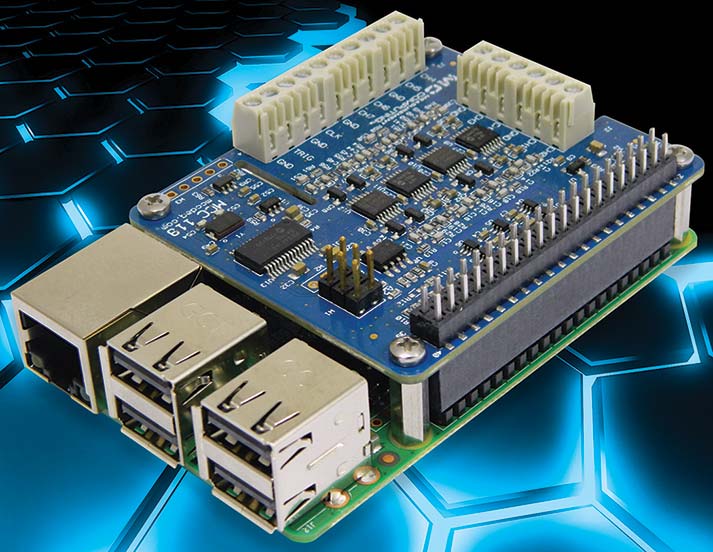
Measurement Computing Corporation announces the release of the MCC 118 voltage measurement DAQ HAT for the Raspberry Pi. Many traditional DAQ users are designing systems around the RaspPi because of its flexibility and low cost. This growing base of Pi users, along with open-source software becoming more industry accepted, is driving growth and making single-board computer use more prevalent in professional DAQ applications.
The MCC 118 provides eight single-ended analog inputs with sample rates up to 100 kS/s for taking single point or waveform voltage measurements. Up to eight MCC HATs can be stacked onto one RaspPi providing up to 64 channels of data and a maximum throughput of 320 kS/s.
MCC DAQ HATs provide quality measurements from a trusted source. Using an MCC DAQ HAT will shorten time-to-market and reduce support costs associated with using non-validated designs.
The open-source MCC DAQ HAT Library of commands in C/C++ and Python allows users to develop applications on Linux. The library is available to download from GitHub. Comprehensive API and hardware documentation is also provided. The MCC 118 is the first in a series of DAQ HATs. A white paper is available at https://www.mccdaq.com/PDFs/DAQ-HAT-White-Paper.pdf.
For more information, contact:
Measurement Computing
www.mccdaq.com
ARBITRARY FUNCTION GENERATORS
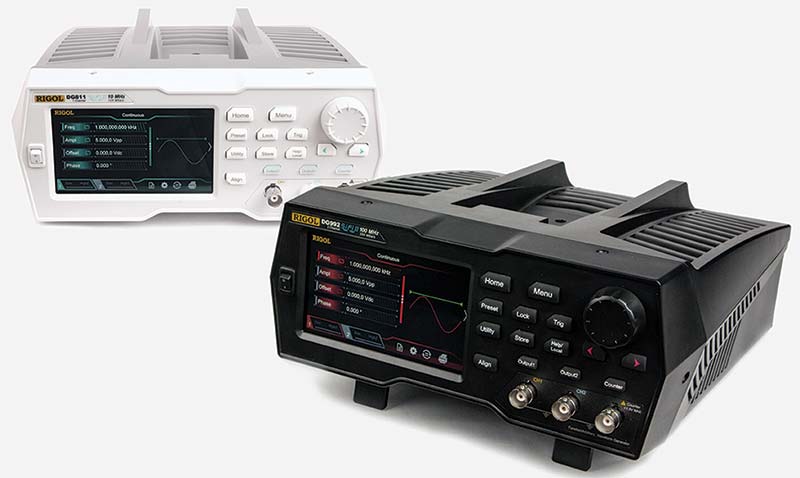
RIGOL Technologies introduces the DG800 and DG900 series of arbitrary function generators. All models come standard with 16-bit resolution, an intuitive touch display, a silent fan-less design, and new advanced signal generation capabilities. These innovations provide unmatched signal generation performance at an unprecedented price point.
The DG800 series is perfect for educators, hobbyists, and engineers needing signal generation from 10-35 MHz. With a starting price of just $279, the DG800 represents one of the most affordable 16-bit generators.
The DG800 allows users to combine cycles of different waveform types to generate complex test sequences. The DG800 also allows users to generate complex dual tone and harmonic signals useful for filter, noise, and RF testing. In addition, integrated PBRS and RS-232 generation make testing control and communications links easier.
The DG900 series delivers all of the same capabilities as the DG800 but with frequency ranges from 50 MHz up to 100 MHz. Starting at just $599, the DG900 is a perfect tool for embedded and IoT engineers needing a performance generator.
Both instruments have a 4.3” TFT color display and can be controlled with a next-generation touch interface. The various attributes make this instrument simple to navigate and intuitive to learn, plus it helps eliminate background noise from your lab or classroom environment.
These new generators are powered by RIGOL’s enhanced SiFi II technology. The SiFi point-to-point sampling technology insures high fidelity arb generation with easy setup and adjustment. RIGOL has enhanced this capability by adding additional interpolation, step, and smooth filtering which allow users to modify waveform characteristics in both the time domain and frequency domain in ways that can be challenging in other point-to-point sampling solutions. The DG800 has six models (10 MHz, 25 MHz, and 35 MHz, all with either one or two channels) starting at $279. The DG900 has three models (50 MHz, 70 MHz, or 100 MHz) all with two output channels starting at $599.
For more information, contact:
RIGOL Technologies
www.RIGOLna.com
LEARN ELECTRONICS CRASH COURSE
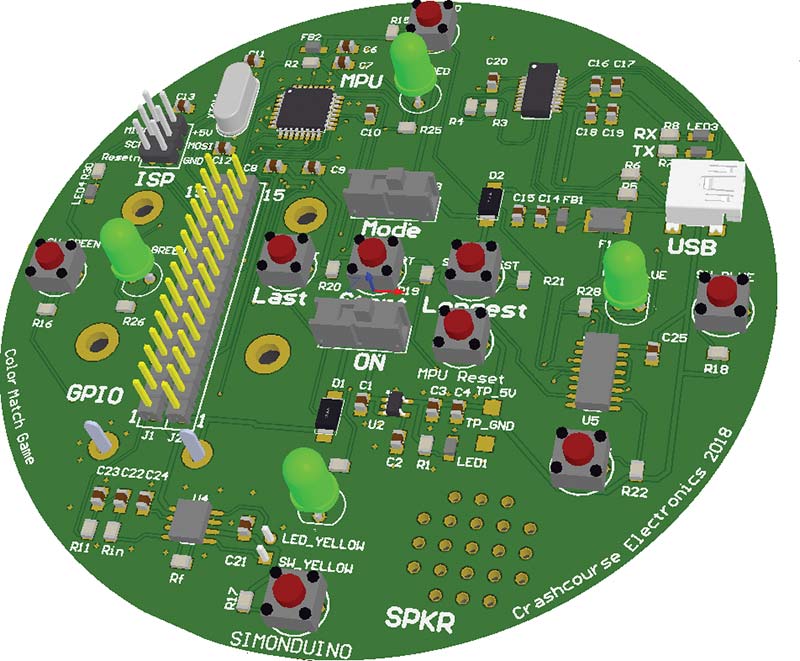
Crash Course Electronics (now available through Udemy, Inc.) is designed to take you from mystery to mastery in electronics and PCB design, learning with Altium CircuitMaker and Labcenter Proteus. This massive course was custom made for those interested in learning electronics from the ground up that wish to leverage that knowledge to build actual printed circuit boards (PCBs).
The course starts with atomic physics and the electron, then moves into Ohm’s Law, circuit analysis, AC, DC, complex impedance, RC and RL circuits, filters, amplifiers, transistors, FETs, analog and digital theory, plus much more
Rather than present courses that are highly technical and math based, Crash Course Electronics was designed to be taken as a journey with the instructor. Every lecture builds on the last, with each new concept fitting like a new puzzle piece. The most complex topics and mathematical concepts are distilled down into understandable lectures that make no assumptions about what you know or don’t know.
As you progress through the lectures, expect to see every circuit and idea worked out on the black board, virtually simulated (with Labcenter Proteus) and built by hand right in front of your eyes in high-def ultra clean video and audio. Not only will you learn all the theory and practical aspects of electrical engineering, there will be countless real world tips and tricks that will take you from a beginner to someone with a deep understanding of the subject matter.
After you go through the basic electronic theory, you will build three complete products. You will discuss the design, the motivation, look up parts, background information, and then design the circuits together with your instructor, lay them out in Altium CircuitMaker, route them, verify, and produce manufacturing files. You will be able to take those files and send them to a number of online manufacturers and get them ready for production. All you’ll have to do is hit “submit.”
The course is based on the included text book, “Design Your Own Video Game Console,” a.k.a., “The Black Art of Video Game Console Design.” This 800+ page book is included free of charge (the PDF version) with the course. Although, game consoles are not discussed in this course, the text will be used for its theory, electrical engineering, and PCB design chapters. A 50% discount code (HAL9000) is currently available.
For more information, contact:
Udemy, Inc.
www.udemy.com
FLEXRES OSCILLOSCOPES
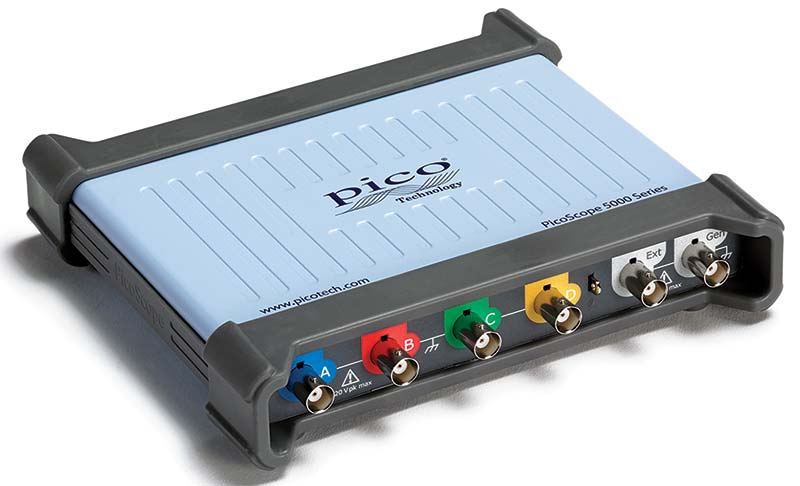
Pico Technology has introduced the 5000D Series FlexRes oscilloscopes and MSOs that feature up to 16 bits of vertical resolution with up to 200 MHz bandwidth and 1 GS/s sampling speed. FlexRes hardware employs multiple high-resolution ADCs at the input channels in different time-interleaved and parallel combinations to optimize either the sampling rate to 1 GS/s at eight bits, the resolution to 16 bits at 62.5 MS/s, or other combinations in between.
PicoScope 5000D MSO models add 16 digital channels, providing the ability to accurately time-correlate analog and digital channels. Digital channels may be grouped and displayed as a bus with each bus value displayed in binary, hex, decimal, or level (for DAC testing). Advanced triggers can be set across both the analog and digital channels.
PicoScope 5000D Series oscilloscopes have waveform capture memory up to 512 megasamples. Deep memory enables the capture of long-duration waveforms at maximum sampling speed. PicoScope’s DeepMeasure™ tool uses the deep memory to analyze every cycle contained in each triggered waveform acquisition. It displays results in a table, with the parameter fields shown in columns and waveform cycles shown in rows. The current version of the tool includes 12 parameters per cycle, and can display up to a million cycles.
Serial decoding and analysis is included as standard. Decoding helps users to see what is happening in their design to identify programming errors and check for signal integrity issues. Key applications are addressed with support for 18 protocols:
- Automotive: CAN, CAN-FD, FlexRay, LIN, SENT
- Embedded: 1-Wire, I2C, I2S, SPI
- Avionics: ARINC 429
- Computer: Ethernet 10 and 100BASE-T, PS/2, UART/RS-232, USB
- Industrial: MODBUS RTU and ASCII
- Lighting: DMX512
- Hobby: DCC
PicoScope 5000D Series oscilloscopes feature a SuperSpeed USB 3.0 connection, providing lightning-fast saving of waveforms while retaining compatibility with older USB standards. The PicoSDK® software development kit supports continuous streaming to the host computer at rates up to 125 MS/s.
PicoScope 5000D Series oscilloscopes are priced from $1,155 for the 5242D two-channel, 60 MHz model through to $3,025 for the top-of-the range 5444D four-channel, 200 MHz mixed-signal model.
For more information, contact:
Pico Technology
www.picotech.com
PASSIVE VOLTAGE OSCILLOSOPE PROBES
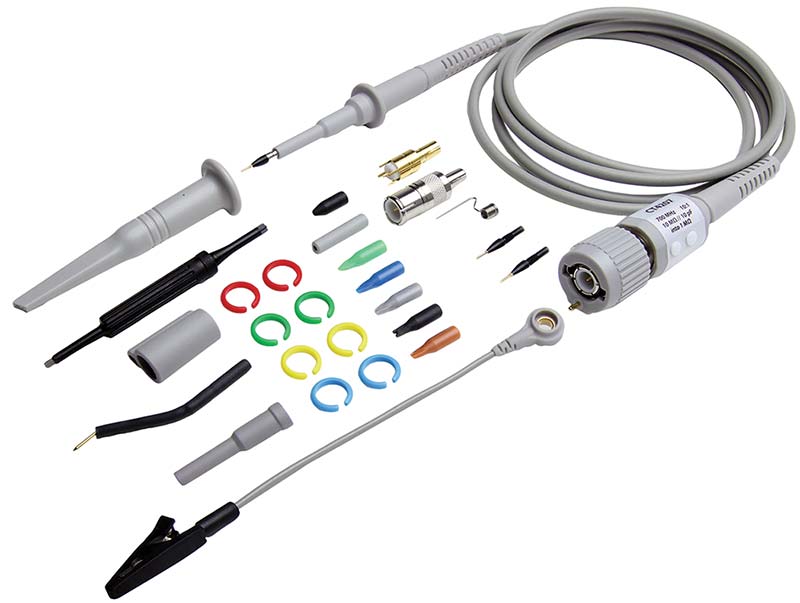
Cal Test Electronics introduces its new CT4200 series of passive voltage oscilloscope probes featuring compact 2.5 mm barrel size and bandwidths from 55 MHz to 1.5 GHz. The eight-model series includes 1x, 10x, 20x, and 100x attenuation ratios. Six models interface with oscilloscopes having 1 MΩ input impedances, while two models require 50Ω input impedances.
The CT4200 series carries the CE listing, including RoHS 2 compliance. The compact size provides easy and accurate probing of today’s high density circuits.
The CT4200 series features:W
- Readout actuator
- Snap-locking sprung hook
- BNC and PCB tip adapters
- IC tip insulators
- Eight color ID rings
- Both fixed and spring-loaded tips, all easily replaceable
- Three grounding options: Spring, swivel, and traditional alligator clip lead
Pricing ranges from $89-$163.
For more information, contact:
Cal Test Electronics
www.caltestelectronics.com
If you have a new product that you would like us to run in our New Products section, please email a short description (300-500 words) and a photo of your product to: [email protected].





